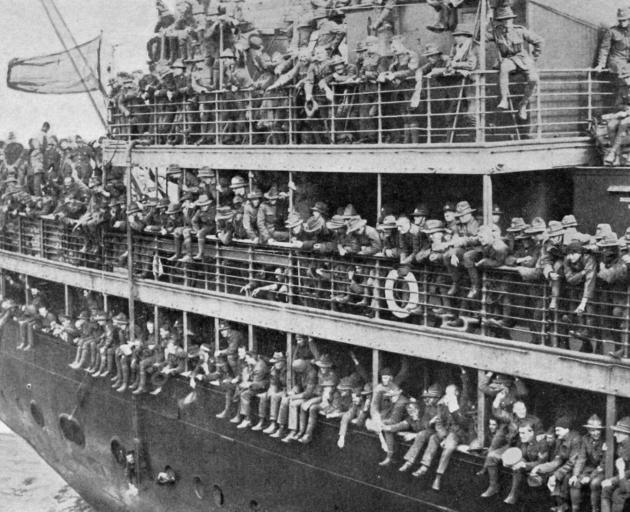
''Jack'' M'Conkey, as he was known by most people, used to drive the bus between Wellington and Island Bay in the days before electric cars and taxi-cabs, and was well known to those who used the road regularly. After the trams came along, M'Conkey entered the employ of Sir George Clifford, in Canterbury, and, having saved a little nest-egg, invested on the lease of a hotel on Lyttelton.
He was so situated when the war broke out, but for all his 61 years he was determined to ''have a go at the Huns'', and such was his spirit that he not only enlisted and got through himself, but induced 200 others in Lyttelton to enlist.
On Thursday, Mr Chatfield received a letter from M'Conkey, together with a bit of shrapnel, which he said had been ''dug out of him'' as the result of being in the fray in France.
At length the authorities had counted him out on account of his age, but, still game, he declares his intention of coming out to New Zealand and trying to enlist here again. And he is 63 years of age!
Women ignored
A Christchurch gentleman who is a frequent and regular traveller between Wellington and Lyttelton, in conversation with a Lyttelton Times reporter, referred to the fact that the stewards on the ferry boats were usually most solicitous for the comfort of men at the port of arrival, displaying great eagerness to carry their luggage, even where the modest grip or valise could not be deemed any encumbrance.
Ladies with children, however, were only too often left to shift for themselves. Seeing, he adds, that the court had decreed ''tipping'' illegal, and that the stewards had chosen a higher wage and no tips to the old conditions of lower wages and unlimited rights to tips, this traveller thinks that the women are entitled to greater consideration both at Wellington and Lyttelton.
Soldiers' farms
Fortunate indeed, says a Hawke's Bay correspondent, are the soldiers who have secured land in the Returned Soldiers' Settlement at Takapau. After the wear and tear of battle, we find them making their homes on the sunny hills of the north.
The soldier farmers have a splendid field for their labour, as the land is some of the best in Hawke's Bay, and well watered by streams. No farm is of less area than 100 acres, and the value of each runs from 2000 upwards. One can read the names of each farm on the gates; all are gathered from Gallipoli, stern reminders of sacred spots on Turkish soil.
Behind the settlement lie the snow-clad Ruahine ranges. Only soldiers are allowed to occupy the block, and well have they earned this peaceful healthy home. When the war is over, and dim in the memory, this settlement will remain a monument to future generations of what the Government has done for those who voluntarily fought their country's battles.
Whaling success
Marked success has attended the whaling enterprise embarked upon this season by Mr James A. Johnston. Within three weeks and one day he has landed two fine right whales and a good-sized fat humpback, the latter being captured on Sunday.
The second right whale was, it is stated, the largest ''cow'' ever secured at Kaikoura. It is estimated to yield over 17 tons of oil. The whalebone measures nearly 8ft in length.
- ODT, 21.6.1917.
COPIES OF PICTURE AVAILABLE FROM ODT FRONT OFFICE, LOWER STUART ST, OR WWW.OTAGOIMAGES.CO.NZ












